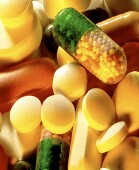Price Plays Part in Perceived Power of Medication
People report cheap drugs are less effective, researchers find.
By Steven Reinberg
HealthDay Reporter
|
E-mail this article
Subscribe to news
Printer friendly version
|

(SOURCES: Dan Ariely, Ph.D., behavioral economist, Duke University, Durham, N.C., and author, Predictably Irrational: The Hidden Forces That Shape Our Decisions; Daniel E. Moerman, Ph.D., William E. Stirton Professor of Anthropology, University of Michigan, Dearborn; March 5, 2008, Journal of the American Medical Association
)
TUESDAY, March 4 (HealthDay News) -- When people think that a medication is expensive, they tend to report more benefit than when they think the drug is cheap, a new study finds.
In fact, 85 percent of people given what they thought was an expensive painkiller said they had reduction in pain, compared with 61 percent of those given the same pill, which they were told was cheap. Most surprisingly, both were the same placebo pill.
"When we gave people medication, a pain placebo, which was discounted, it was less effective," said lead researcher Dan Ariely, a behavioral economist and visiting professor of marketing at Duke University, and author of Predictably Irrational: The Hidden Forces That Shape Our Decisions.
A placebo works on the power of expectations, Ariely explained. "When people doubt the efficacy, the efficacy goes down, in this case because of a discount," he said. "The interesting thing is that marketing variables that have nothing to do with the medication modulate expectation, and therefore can modulate the efficacy of medication."
The report is in the March 5 issue of the Journal of the American Medical Association.
In the study, Ariely's team gave 82 people a light electric shock to measure their perception of pain. This test was given before and after the individuals were given what they were told was a pain pill.
Half the people were given a brochure that described a new painkiller that cost $2.50 a dose. The remaining individuals were given a brochure that described the pill as having been marked down to 10 cents.
The researchers found that among those who thought the pill cost $2.50, 85 percent reported having pain relief. However, for those given the 10-cent pill, only 61 percent reported any pain relief.
"When you expect to get something on discount, and you expected it to be worse, it can actually be worse," Ariely said.
An important implication of this study is how does one present discounted drugs to patients without them thinking they are inferior, Ariely said. "How do we give discounted drugs to people we want to give discounted drugs without giving them the negative side effects?" he asked.
The problem is having people understand the price of the drug is not a function of the effectiveness of the drug. Ariely wonders if discounted drugs and small co-pays give people the impression that the drugs are of lower quality.
One way of reducing the effect of cost on the perception of efficacy is when patients understand why they are getting the discounts they are getting, Ariely said. Another strategy is for doctors to explain to their patients the benefits of the drug and that cost is not related to the performance of the drug.
One expert agreed that price is tied to perceived value, whether it involves cars or drugs. Overcoming the perception about drugs and price is something that doctors can help patients do.
"These findings fit exactly with the way we Americans are," said Daniel E. Moerman, the William E. Stirton Professor of Anthropology at the University of Michigan, in Dearborn. "We all think expensive cars are better, but even a cheap car will get you to the store."
Moerman thinks that since price plays such a pivotal role in people's perception of drug efficacy, many people probably doubt the quality and efficacy of generic drugs.
Although generic drugs are pharmacologically the same as brand-name drugs, "meaningfully, I can't help it, they are not the same," Moerman said. "This means that physicians are going to have to compensate in some other way."
Doctors need to take the time to educate their patients about the benefit of the medication they are prescribing, Moerman said.
"If you have patients whose drugs are shifting to generics, maybe you need to pay a little more attention to the change and convey enthusiasm about these generic drugs. You can indicate that they are exactly the same as the drug they have been taking in the past -- they're better, because they don't cost as much," he said.
More information
For more on the placebo effect, visit the Creighton University School of Medicine. 
Copyright © 2008 ScoutNews, LLC. All rights reserved. 
HealthDayNews articles are derived from various sources and do not reflect federal policy. healthfinder.gov does not endorse opinions, products, or services that may appear in news stories. For more information on health topics in the news, visit the healthfinder.gov health library.